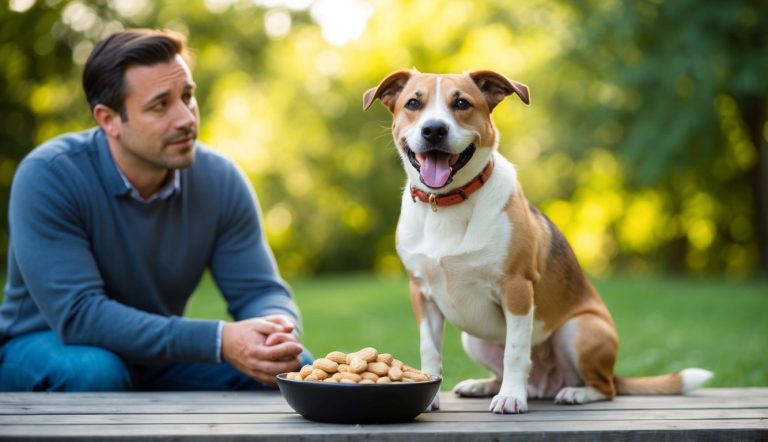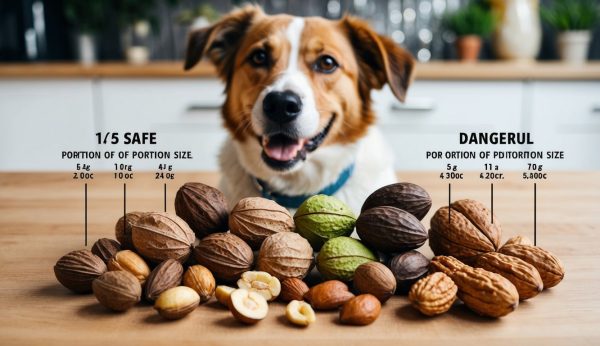Can Dogs Eat Peanuts? Overview
Dogs can eat peanuts, but preparation and portion size matter. While peanuts offer some nutrients, they also come with a few important risks and limitations.
Nutritional Content of Peanuts
- Peanuts are a good source of protein, vitamin E, niacin, and healthy fats for dogs. These nutrients help support energy, skin, and coat health. Peanuts also contain fiber, which can help with digestion.
- However, peanuts are high in fat. Too much fat can lead to weight gain and digestive problems in dogs. Fatty foods may also raise the risk of pancreatitis, a painful and dangerous inflammation of the pancreas.
- Peanuts do not contain toxins like some other nuts, such as macadamia nuts or walnuts. Still, they offer more calories than many dog treats. It’s best to give peanuts in small portions and only as an occasional snack.
General Safety Concerns
- Plain, unsalted, and dry-roasted or raw peanuts are the safest choice for your dog. Salted or flavored peanuts are not safe because extra salt and seasonings can harm your dog’s kidneys and cause stomach upset.
- Avoid feeding your dog peanuts that have chocolate, xylitol, or other additives. Chocolate and xylitol are both very toxic to dogs and can cause severe illness or even death.
- Peanut shells pose a choking risk and can be hard on your dog’s digestive system. Only give dogs shelled peanuts and watch for signs of allergy, such as itching, swelling, or vomiting. According to veterinary advice, peanuts are safe for dogs in moderation, but you should monitor your dog for any reactions.
Recommended Serving Sizes
- Serve only small amounts of peanuts to your dog. For most dogs, 1–2 plain, unsalted peanuts given as a treat is enough. Too many peanuts lead to too much fat and calories.
- Do not use peanuts as a daily treat. Use them as an occasional reward or to hide medication. Always skip peanut butter with added sugar, salt, or xylitol.
- If your dog is small or has a history of stomach problems, offer even fewer peanuts. Watch for signs like diarrhea or vomiting after your dog eats peanuts. If unsure, speak with your veterinarian about safe serving sizes and how often you can give peanuts to your dog.
Potential Health Benefits of Peanuts for Dogs
Peanuts have some nutrients that can be helpful for your dog when given as a treat. They offer protein, healthy fats, vitamins, and minerals that may support your dog’s health in small amounts.
Protein and Healthy Fats
- Peanuts are a good source of plant-based protein. Protein helps build and repair muscles, and it is important for growing puppies and active dogs. Only give plain, unsalted, and shelled peanuts to your dog.
- Dogs also get healthy fats from peanuts, mainly monounsaturated and polyunsaturated fats. These fats can help with skin and coat health, making their fur look shiny.
- Too much fat, though, can lead to weight gain and stomach problems, so moderation is key. Giving a few peanuts as an occasional treat is enough to get the benefits without the risks.
Vitamins and Minerals
- Peanuts have important vitamins and minerals that support your dog’s body. They contain vitamin E, which acts as an antioxidant and helps the body protect cells from damage. They also offer vitamin B3 (niacin), which helps with energy and metabolism.
- Magnesium, phosphorus, and potassium in peanuts help keep your dog’s muscles healthy and keep their nervous system working well. These nutrients can benefit your dog’s skin, metabolism, and even cognitive function.
- Peanuts should never replace your dog’s usual food, but small amounts can be a source of useful nutrients. Always use unsalted, dry-roasted, or raw peanuts without shells to keep your dog safe.
Risks and Dangers of Feeding Peanuts to Dogs
Peanuts may seem harmless, but they can cause problems for your dog. Some risks are clear right away, while others can build up over time.
Choking Hazard and Allergies
- Peanuts that are not shelled or are given whole can be a serious choking risk, especially for small dogs. Hard shells can also block your dog’s intestines if swallowed. Always remove shells first and break peanuts into smaller pieces.
- Some dogs may have allergies to peanuts. This can cause itching, swelling, or stomach problems. The most serious allergic reaction is anaphylaxis, which is rare but life-threatening. If your dog vomits, has trouble breathing, or develops hives after eating peanuts, get help from a vet right away.
- It’s a good idea to watch your dog closely after trying any new food, including peanuts. Sudden changes in behavior or health should not be ignored. You might want to avoid flavored nuts, as added seasonings can also cause reactions.
High Fat Content and Pancreatitis
- Peanuts are high in fat, and feeding your dog too many can easily lead to weight gain. Dogs do not need a lot of extra fat in their diet. Too much fat at once can make it hard for dogs to digest their food and cause stomach upset.
- One of the most serious risks is pancreatitis. This is when the pancreas becomes inflamed and can cause vomiting, diarrhea, belly pain, and loss of appetite. Dogs who have had pancreatitis before or are overweight are especially at risk.
- Too much fat from peanuts or peanut butter can lead to health issues over time. Always feed small portions, and do not make peanuts or peanut butter a daily habit for your dog. Choose plain, unsalted peanuts and avoid those with added oils or sugars.
Aflatoxin Poisoning
- Peanuts can sometimes be contaminated with a toxin made by mold called aflatoxin. Even small amounts of aflatoxin can be dangerous for dogs. This toxin can harm your dog’s liver or, in severe cases, can even be deadly.
- Symptoms of aflatoxin poisoning may include loss of appetite, yellow skin or gums, vomiting, or unusual tiredness. If you notice these signs, contact your veterinarian right away.
- Store peanuts in a cool, dry place to slow the growth of mold. Only offer your dog peanuts meant for humans, as lower-quality peanuts may have higher levels of aflatoxin.
Toxic Foods and Unsafe Ingredients to Avoid
Certain nuts and food additives can be dangerous for your dog. Paying close attention to ingredient labels and food types helps you keep your dog safe and healthy.
Nuts That Are Harmful to Dogs
- Not all nuts are safe for dogs. Macadamia nuts are highly toxic and can cause muscle shakes, vomiting, fever, and weakness. Even a small amount may make your dog sick.
- Cashews are not toxic but are very high in fat, which may lead to stomach upset or even pancreatitis in some dogs. Large amounts should be avoided. Walnuts and pecans can also pose a risk, mostly because they may contain mold or toxins that can cause seizures or neurological problems.
- Almonds are hard and can cause choking or blockages. They also have a high fat content. In addition to nuts, avoid letting your dog eat grapes and raisins as these can cause kidney failure. Many mushrooms, onions, garlic, and avocados are also dangerous for dogs.
Toxic Additives Often Found in Nut Products
- Some peanut butters and nut snacks contain extra ingredients that can seriously harm dogs. Xylitol, a sugar substitute, is especially dangerous. Xylitol can cause a sharp drop in blood sugar, leading to seizures or even death.
- Other harmful additives include chocolate, which contains theobromine and caffeine, both of which are toxic to dogs. Sugar alcohols, like sorbitol and erythritol, can cause stomach upset. Avoid products with extra salt or artificial flavors.
- Never give nut products with added onion or garlic powder. Both are toxic, even in small amounts. Raw eggs should also be avoided, as they can carry bacteria and lower your dog’s ability to absorb vitamins. Always read the ingredient label before sharing any nut product with your dog.
Considerations for Peanut Butter and Other Related Products
Peanut butter and similar spreads are popular treats for dogs, but not all products are created equal. Look for products made only with safe ingredients, and check for additives that can harm your dog.
Peanut Butter Safety
- Peanut butter can be a tasty reward for your dog. It provides protein, healthy fats, and vitamins B and E. However, safety depends on how much and what type you use. Give it in small amounts, as too much fat can cause an upset stomach or even pancreatitis.
- Some brands include xylitol, a sugar alcohol that is dangerous for dogs even in tiny amounts. Xylitol causes a quick drop in blood sugar and can lead to seizures, liver failure, or death. You should only use plain, unsweetened peanut butter without sugar substitutes. Avoid flavored or reduced-sugar versions.
- Stick with peanut butter that lists only peanuts or peanuts and a little salt. Never use products with xylitol, as they can be deadly to your pet. Double-check even trusted brands before giving them to your dog.
Reading Ingredient Labels
It is important to read ingredient lists every time you buy peanut butter. Some brands change their recipes or add sugar alcohols like xylitol. Check both the front and the back of the label for hidden risks.
What to avoid:
- Xylitol (sometimes listed as “sugar alcohol”)
- Artificial sweeteners
- Added sugar and salt
- Flavors or other additives
What to look for:
- Only peanuts or peanuts and a small amount of salt
If a label lists an ingredient you do not recognize, avoid giving it to your dog. For extra safety, ask your veterinarian before offering any new product.




